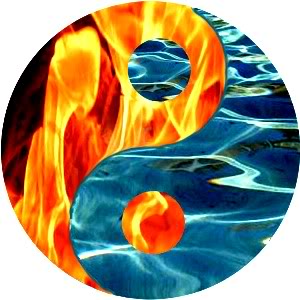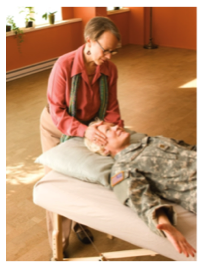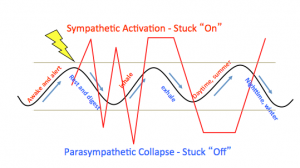Acupuncture for Healing Trauma
 The concept of qi or energy is Acupuncture’s unique contribution to the treatment of trauma and traumatic stress.
The concept of qi or energy is Acupuncture’s unique contribution to the treatment of trauma and traumatic stress.
Qi is the most powerful concept in all of Chinese medicine. When our Qi/energy is balanced and flowing smoothly, our natural, self-healing capacities are maximized. Acupuncturists work with qi. We help bring quiet to jangled nerves; help people navigate obstacles in their healing journey; find compassion for themselves and others; digest the gristle that remains from difficult life memories; find inspiration and let go. Trauma, after all, is not in the experience — it is in a discrete person’s body, which houses their unique soul and their unique spirit.
Qi/Energy has a more substantial, material, grounded, aspect we call yin; and a more ethereal, immaterial and unformed aspect we call yang.
Just as tension between positive (yang) charges and negative (yin) charges creates an electro-magnetic field, the tension between the opposing poles of yin and yang create qi. When these forces are in equal tension, we have homeostasis or balance.
Acupuncture is energy medicine. Acupuncture helps regulate qi.
Our Qi can get depleted – we can feel tired.
Our Qi can get stuck – we can feel like a skip on a broken record or a frustrated and incomplete punch.
Our Qi can get disorganized – like it does in the trauma spectrum response.
Qi is the energy behind our muscle movements, thoughts, and spiritual longings. It is always there, even in the most difficult of circumstances to help us heal. Qi provides the power necessary for growth, development, movement, and maintenance of body temperature, protection against illness and disease, and overall regulation of the body.
Qi empowers our life. We protect it by eating the right amounts of the right kinds of food; by balancing our needs for rest and exercise; by protecting ourselves from extremes of weather and by being moderate in our emotions. Acupuncturists look for small and subtle expressions of disturbance of qi, so we can help bring balance before illness manifests, and to support people reaching their fullest potential.
Qi may sound like something very foreign – but every time you smile, burp, or cry; feel hungry, angry, or tired; have a thought, musing or inspiration; chop wood, carry water or go for a hike; and even when you feel inspired to pray — it is your qi expressing itself in your body, your mind, your emotions and your spirit.
Qi flows in meridians throughout the body. Acupuncturists use hair-thin needles at particular locations to help regulate qi.
Qi moves with a rhythm, inside a boundary
In health, we live our lives gently moving between opposing poles — we move from being awake and alert naturally and easily into resting and digesting; we inhale and then exhale with steady, unencumbered, even breaths; our hearts quietly beat and rest, day turns into night turns into day; summer turns into winter and into summer again. We, together with all of nature, are gently and rhythmically moving between activity and stillness, between yin and yang.
Yin is quiescent, restorative, internal, dark, cool and quiet; Yang is active, external, assertive, bright, and warm. Yin and Yang are easily translated to the language of the autonomic nervous system — Parasympathetic Restoration is yin; and Sympathetic Arousal is yang. Different maps, same territory.
This foundational principle of balance and regulation between opposing states of mind, or states of being, makes acupuncture a powerful resource for people with ANS dysregulation caused by traumatic stress.
Acupuncture is particularly valuable for those “strange, rare, and peculiar” problems that are difficult to diagnose and difficult to treat. Things like fibromyalgia and neurological pain patterns, chronic fatigue, insomnia, allergies, stress-related illnesses like irritable bowel syndrome, migraine headaches and emotional upset. It seems that when we help the body come back to balance, that many of these kinds of elusive problems “right” themselves.
The vast majority of us experience the challenges of life; things like automobile accidents, trips and falls, street crime, medical procedures, natural disasters or growing up with less than perfect parents, without meeting the diagnostic criteria for Post Traumatic Stress Disorder in the DSM V. However, many without diagnosed PTSD experience themselves feeling somehow chaotic or disordered – sometimes right away, sometimes months or years later. In Chinese terms, the distinction “PTSD” is seen more as a continuum of disturbance and dysregulation of qi than as a particular finite diagnosis.
Those extreme states of sympathetic activation or parasympathetic collapse that arise out of an instinctive fight, flight or freeze response are precisely what helped us survive life’s challenges. We don’t see those survival responses as “disorders”; it is our life-preserving qi, guiding and informing our survival –doing what it was meant to do to help us survive.
At Integrative Healing, we think of these traumatic stress responses as natural survival responses to be grateful for – responses that may need some support to get unstuck or re-regulated; but not as pathologies, and certainly as a life-sentence.
Acupuncture and integrative health care
 We are fortunate to live at a time and in a place where the best of Western medicine and the best of Eastern medicine can come together in service to our patients. This coming together is particularly advantageous for patients suffering with complex, multi-symptom illness such as we find with responses on the trauma spectrum.
We are fortunate to live at a time and in a place where the best of Western medicine and the best of Eastern medicine can come together in service to our patients. This coming together is particularly advantageous for patients suffering with complex, multi-symptom illness such as we find with responses on the trauma spectrum.
Acupuncture can be a very helpful adjunct to other care you may be receiving. Those working with psychotherapists may find that acupuncture helps them integrate and embody insights. Their cognition may improve, enhancing their ability to make use of psychotherapy. Acupuncture brings energy to physical injuries and can support the work of Physical and Occupational Therapists. Those patients working with pharmaceuticals may find that some of the side effects of necessary medications are mitigated. Some are able to reduce dosages or eliminate the use of some medications – for sleep or pain for example.


